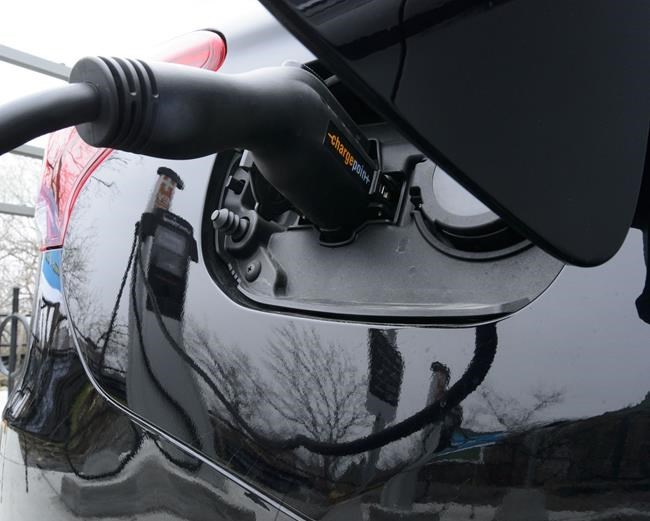
A car is charged at a charge station for electric vehicles on Parliament Hill in Ottawa on Wednesday, May 1, 2019. THE CANADIAN PRESS/Sean Kilpatrick
Republished March 14, 2022 - 2:29 PM
Original Publication Date March 14, 2022 - 12:11 PM
OTTAWA - More new electric vehicles hit the road in Canada last year than ever before but the growth is nowhere near what is happening in Europe.
Statistics Canada says 65,253 new battery-only and plug-in hybrid electric cars were registered in the first nine months of 2021, more than the number registered across 12 months in any previous year.
In all of 2020, Canadians registered 54,353 electric vehicles, often referred to as EVs. In 2019, there were 56,165.
Data for the final three months of 2021 is not yet available but for the first nine months, EVs represented five per cent of new cars registered, up from three per cent in both 2020 and 2019.
Joanna Kyriazis, a program manager at Clean Energy Canada, said it is good news to see growth in Canada's EV market, but it's not keeping pace with Europe.
In 2019, France, Germany and the United Kingdom were on par with Canada with electric cars making up between 2.5 and three per cent of all new registrations. By last year, electric vehicles made up almost 18 per cent of new registrations in the U.K., 19 per cent in France and 26 per cent in Germany.
"So they started at the same place as Canada in 2019 and in two years they've seen sales really skyrocket," Kyriazis said. "So I'm hoping that Canada is about to see that same sort of exponential growth in EV sales if we can get around these supply issues."
Kyriazis said demand in Canada is strong, pointing to a recent survey Clean Energy Canada did that found 80 per cent of Canadians were open to buying an electric car before the recent spike in gas prices.
She said the issue is availability.
"Record-low inventory levels are making it so dealerships can't keep up and Canadian drivers are waiting not just months, but in some cases years, to get their hands on a new EV," she said.
Canada has set targets that by 2030, half of new cars registered will be zero-emission vehicles, and by 2035, all of them. That includes battery-only, plug-in hybrid and hydrogen-fuel cell vehicles.
Environment Minister Steven Guilbeault is currently consulting on how best to hit those targets, including a mandatory sales quota system similar to those that already exist provincially in Quebec and British Columbia.
Dealerships that don't sell a big enough proportion of zero-emission vehicles face financial penalties.
Kyriazis said sales mandates are a critical part of the solution because they compel automakers to adjust their production and distribution of vehicles and she said Guilbeault has to follow through with one nationally.
In a written statement Monday, Guilbeault said the government remains committed to doing it.
Three in every four electric vehicles registered in Canada last year were sold in B.C. and Quebec. Kyriazis said the mandates are the main reason because they compel automakers to ship most of the available electric vehicles to dealers in those provinces.
Quebec and B.C. also have provincial rebates layered on top of the $2,500 to $5,000 rebate offered by the federal government for many new electric car purchases.
Brian Kingston, president of the Canadian Vehicle Manufacturers' Association, said automakers believe the rebates, not the sales quotas, are what makes the difference.
"We don't see evidence of ZEV mandates or quotas having any impact on demand," he said. "In both B.C. and Quebec, we saw an uptick the moment the (cash) incentive came in place."
In Ontario, when the newly elected Progressive Conservative government did away with a provincial rebate in 2018, sales plummeted. Last spring, when Prince Edward Island and New Brunswick introduced provincial ZEV rebates, electric car sales began to climb.
Nova Scotia and Newfoundland and Labrador also started rebate programs last year but their EV sales statistics aren't reported individually by Statistics Canada.
Kingston's group represents Ford, General Motors and Stellantis, which account for almost two-thirds of the passenger vehicles produced in Canada. The association last week launched a campaign to push the federal government to do more for EV adoption, including investing in public education, investing more in public charging networks, increasing the size of the rebate as much as another $10,000, and expanding which cars qualify for it.
The next federal budget is widely expected to expand the program to used vehicles and more expensive ones, though it's not clear how much bigger the rebate would get.
The automakers do not want the government to proceed with a sales mandate.
This report by The Canadian Press was first published March 14, 2022.
News from © The Canadian Press, 2022